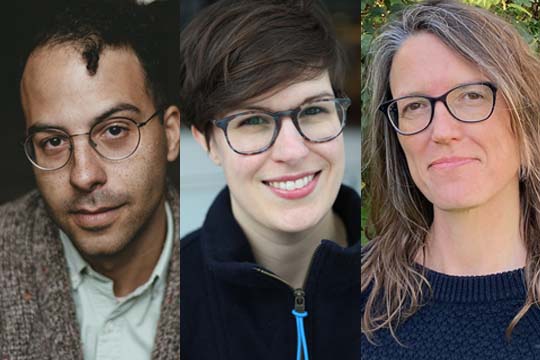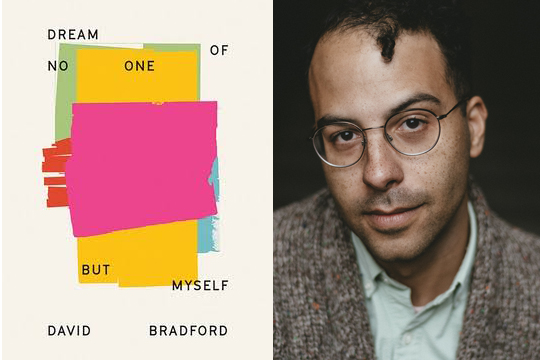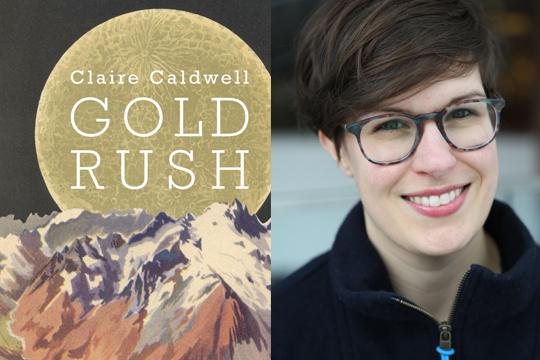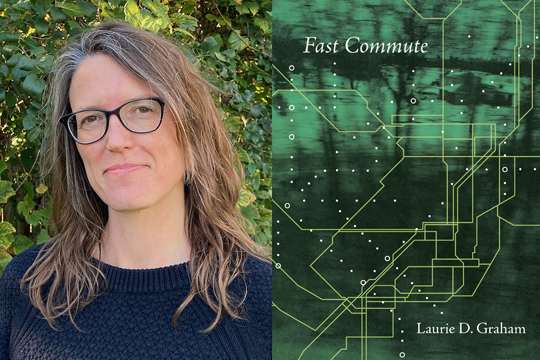What We're Reading: Poetry Alumni [Spring 2022]
 As National Poetry Month draws to a close, there's lots to look forward to in addition to more sun and warmer weather.
As National Poetry Month draws to a close, there's lots to look forward to in addition to more sun and warmer weather.
We asked poetry alumni David Bradford, Claire Caldwell, and Laurie D. Graham to share what books and media are inspiring them this spring...
 David Bradford
David Bradford
2016 Cohort
Dream of No One but Myself
October 2021 (Brick Books)
I've been reading fitfully for a while now. Between research and reading for work (I curate events at a literary Festival, among other things), it's been hard to get work brain out of my reading, which has uncharacteristically kept me more or less out of books over the last year. But I've also taken some big steps as a literary translator in that time—my first book-length translation, of Désormais, ma demeure by Nicholas Dawson, is due out from Brick Books in 2023—and that’s powered a recent turn toward francophone literature here in Quebec, which is maybe jogging my work brain loose a bit. I’ve been getting to know the local scene, particularly local authors of colour and queer writers, so this kind of reading is an early ongoing for me, and it’s been a bit of a relief as a reader. I find myself reading for pleasure, reading for what might excite me as a translator (work again, but fantasy-football kind of work), and it kind of brings me back to that joy I had as a (younger) emerging writer—figuring out a scene, continually coming across exciting discoveries, just appreciating books. So, a few books that got me to those readerly vibes: Quand je ne dis rien je pense encore by Camille Readman-Prud’homme, La Voleuse by Daria Colonna, and most recently, La Minotaure by Mariève Maréchale. Maréchale’s debut novel is what I’m working my way through now, and I’m loving it. It’s deep in stakes and themes of gender identity and surveillance, but here somehow addressed with a sharp, almost blithe lightness. It’s a story told in letters to a close, departed friend, where the narrator finds themself visited by and working against Quebec’s own bigoted boogeyman, le Bonhomme Sept Heures. I don’t quite know where it’ll take me yet, but it’s wild and nimble and I’m really enjoying it.
David Bradford is a Black poet, organizer and translator. His first book of poetry, Dream of No One but Myself (Brick Books, 2021), was shortlisted for the Griffin Poetry Prize and the Gerald Lampert Award and his second book, Bottom Rail on Top is forthcoming from Brick Books in 2023. A founding editor of House House Press and a graduate of the University of Guelph MFA in Creative Writing, Bradford is based in Tiohtià:ke (Montréal).
Upcoming: A featured reading at Accents Open Mic, May 1 (La marche d'à côté, mtl), and reading at Moments Expozine, May 6. Watch for the 2022 Griffin Poetry Prize Announcement, June 15 via the Griffin Trust's social media channels.
 Claire Caldwell
Claire Caldwell
2010 Cohort
Gold Rush
April 2020 (Invisible Publishing)
I just finished reading A Psalm for the Wild-Built by Becky Chambers, a novel about a monk and a robot meeting in the wilderness of a distant moon. I'm not usually a big sci-fi reader, but I found the voice and world irresistible, and the story is such a moving, funny, and imaginative reflection on nature and human nature and how we care for other living beings. Speaking of nature, I've gotten into birdwatching during the pandemic, and I've spent the winter months working my way through A World on the Wing by Scott Weidensaul. It's a pretty mind-blowing look at bird migration around the world. I'm finishing it up just as songbird migration kicks into gear here, and feel like I'm heading into spring birding with a whole new appreciation for the epic journeys these seasonal visitors have undertaken. Poetry-wise, I've been spending time with Liz Howard's remarkable Letters in a Bruised Cosmos, and Sanna Wani's gorgeous and moving My Grief, the Sun.
Claire Caldwell is the author of two poetry collections, Gold Rush (Invisible Publishing, 2020) and Invasive Species (Wolsak and Wynn, 2014). Based in Toronto, Claire is the Senior Editor at Annick Press, where she acquires and edits books for kids and teens. She a graduate of the University of Guelph MFA in Creative Writing.
 Laurie D. Graham
Laurie D. Graham
2008 Cohort
Fast Commute
March 2022 (McClelland & Stewart)
Ground zero was the homestead. The fabled quarter-section to which all subsequent benefits of education, middle-class tenure, and psychological self-confidence had flowed. . . . I can now appreciate what I had unknowingly done: brought into a single imagined space the two historical sources of my identity—a homestead on Treaty 6 territory and a village in Galicia, circa 1900.
— Myrna Kostash
I’ve been watching and re-watching this video series called “askîy / земля / the land,” presented by the Indigenous Ukrainian Relationship Building Initiative in amiskwaciy-wâskahikan / Edmonton. This project has expanded my knowledge about both Indigenous and Ukrainian land-based practices, about who I am and where I come from, and about how to live in better relationship with the land and all its inhabitants.
My mother has a similar background as Myrna Kostash, one of the speakers in this series. Kostash wrote a book about Ukrainians in Western Canada called All of Baba’s Children; it was published in 1978 and it has never been out of print. Over the course of many more books, Kostash has been reckoning with her settler story in ways that are changing how Ukrainians understand themselves on this continent. I make sure to take notes whenever she speaks.
I’ve also learned much from another speaker, Matt Hiltermann, Métis from what’s now Alberta, about the Beaver Hills, just east of where I grew up, now a Unesco-designated biosphere, and significant lands for the Métis people, their full history elided, kept out of what Kostash calls “our settler mythologies,” that erasure an inheritance I aim not to pass down. I’m learning a lot from this series, and I’m so thankful for it.
Laurie D. Graham is a writer, an editor, and the publisher of Brick magazine. She grew up in Treaty 6 territory, outside of Edmonton, and she currently lives in Nogojiwanong, aka Peterborough, Ontario, in the territory of the Mississauga Anishinaabeg. Her newest book of poetry, Fast Commute, is out now from McClelland & Stewart; her other books are Rove and Settler Education.
Upcoming: Subscribe to Kathryn Mockler's Send My Love to Anyone newsletter to read an excerpt from Laurie’s most recent book, Fast Commute.
 As National Poetry Month draws to a close, there's lots to look forward to in addition to more sun and warmer weather.
As National Poetry Month draws to a close, there's lots to look forward to in addition to more sun and warmer weather. David Bradford
David Bradford Claire Caldwell
Claire Caldwell Laurie D. Graham
Laurie D. Graham